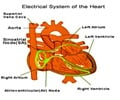A routine examination by a doctor works almost as well as an electrocardiogram - better known as an ECG or EKG - in predicting heart disease, according to a study published Friday.
A recent study has lauded doctors by stating that routine examinations by a doctor to predict heart disease are as good as electrocardiograms ie ECGs or EKGs.
ECGs are often given to people thought to have had an attack of angina, a condition characterized by sharp chest pains that is a common symptom of coronary artery disease.Angina is experienced by about 1 in 50 people in Britain, where the study was conducted.
The ECG test is administered by placing electrodes on the skin and recording the electrical activity of the heart over time to check for abnormal rhythms.
It has been shown to be effective in detecting damage, but its ability to predict future heart disease was unknown, according to the study, published in the British Medical Journal.
A team of researchers led by Adam Timmis, a professor at the London Queen Mary's School of Medicine and Dentistry, studied 8,176 patients with suspected angina and no prior history of heart disease.
All the patients received a standard clinical assessment, looking at criteria including age, sex, ethnicity, duration of symptoms, description of chest pain, smoking status, and history of hypertension and medicines.
Advertisement
All the subjects were monitored over the following year.
Advertisement
A routine clinical assessment, they found, was almost as good a predictor of future heart problems.
"These findings are a reminder of the importance of taking a detailed history and making a thorough physical examination," wrote Beth Abramson, director of Saint Michael's Hospital in Toronto, in a commentary, also in the British Medical Journal.
"The additional information from the ECG is helpful in some patients but does not predict risk in everyone."
Source-AFP
TAN















